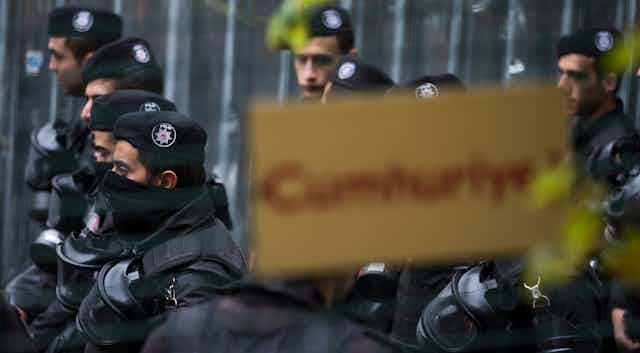This article is part of the Democracy Futures series, a joint global initiative with the Sydney Democracy Network. The project aims to stimulate fresh thinking about the many challenges facing democracies in the 21st century.
The war of rhetoric between Turkey and Russia dramatically escalated recently when Vladimir Putin accused Turkish forces of shooting down a Russian jet to protect Turkey’s oil trade with Islamic State (IS). Such accusations add to a long line of similar charges made against the former prime minister and now president, Recep Tayyip Erdoğan, and his Justice and Development Party (AKP).
Though Erdoğan and his AKP cadres deny any ties to IS, their policies and actions in Syria are shrouded in secrecy. Pushes for transparency and attempts by journalists and legal practitioners to hold the government to account have proven virtually futile and at times dangerous.
Turkey’s snap elections on November 1 were seen as a chance to reverse this trend. However, hopes of reinvigorating the democracy stifled by the illiberal politics of the Erdoğan-AKP nexus were short-lived. The AKP won a resounding victory.
Democratic process, undemocratic outcomes
Given what has already happened, the AKP’s win could well lead to democracy sliding further away from Turkey, even to the point of its demise. It’s perplexing that such a potentially undemocratic outcome has been sanctioned through the democratic process.
Under the AKP, Turkey has witnessed a rollback of political and civil rights in recent years. This includes forced takeovers of critical media outlets and holdings, jailing of journalists, violent police crackdowns on anti-government protests, whitewashing of serious corruption allegations against party officials, and the general deterioration of the rule of law.
An increasingly authoritarian government has, over its 13 years of single-party reign, gradually insulated itself from legal and societal challenges.

The AKP has made no secret of its plans for a constitutional overhaul. Unlike much-sought-after liberalising changes, the AKP’s model will deliver the opposite.
The planned shift from a parliamentary to a presidential system amounts to “super-presidentialism”. Authority will be concentrated in the hands of the president without the checks and balances of the US system. Ultimately, this ensures Erdoğan will attain “one-man rule” and potentially end democracy in Turkey.
Ballot box treated as a blank cheque
Erdoğan and his AKP view the ballot box as the only form of accountability and legitimacy they need. In Turkey, democracy has traditionally lacked institutionally robust mechanisms of vertical and horizontal accountability. Elections have become a winner-takes-all majoritarian system.
The thinking is that electoral victory legitimates all government policies and actions. In other words, beyond the ballot box, there should be no moral or legal constraint on its rule.
Predictably, the AKP’s electoral victories since 2002, coupled with Erdoğan’s strong sense of mission, have increased their distaste for criticism and opposition. An overwhelming majority throughout its rule has enabled the AKP government to be largely unhindered and unaccountable to political and judicial scrutiny.
Firmly back in control, the AKP has promised to follow through with its constitutional project. Transparency is ever decreasing. The clampdown on personal and political freedoms continues.
In this environment, critics of the government are lambasted as resisting or acting against the “national will”. The angry, condescending and authoritarian tone in response to any criticism, especially of Erdoğan, illustrates the party’s majoritarian or even plebiscitarian interpretation of democracy.
Herein lies the fundamental challenge for democracy: there is nothing that cannot be questioned and revised when supported by enough numbers. At its most extreme, this applies to the institution of democracy itself. Since democratic principles and processes open politics to all perspectives for debate, there is no safeguard against actors who peddle anti-democratic values from attaining power via the democratic process.
Erdoğan and the AKP know this. Aware that they are unable to shake the normative draw of democracy, they operate under its guise.

They are unwilling to strengthen democratic institutions, while manipulating its processes. Instead of openly violating democratic rules, the incumbents routinely abuse the resources of the state by denying the opposition media exposure, harassing critical media and using their majority to pass legislation unilaterally for self-seeking agendas.
Journalists, opposition politicians and other government critics may be spied on, harassed or arrested. None of this is alien to the Turkish experience.
For the AKP, democracy involves nothing more than victory at the ballot box. This “proves” the nation’s leaders have legitimacy in the eyes of the people whom they dominate from the saddles of high power. Though their words are coloured by the language of democracy, their track records are anything but democratic.
The AKP-Erdoğan situation is not unique to Turkey. They belong to a global breed of undemocratic actors who are paradoxically sustained within the democratic framework. The days when the game of democracy was for democrats only are long gone.

